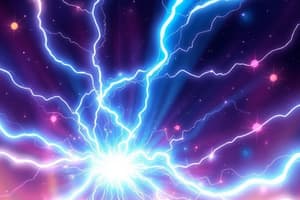Podcast
Questions and Answers
What is the role of the electric field?
What is the role of the electric field?
- To quantify electric charge
- To indicate the force that charged particles experience around a charged particle (correct)
- To determine the magnitude of a charge
- To measure electric potential
Which of the following is true about types of electric charges?
Which of the following is true about types of electric charges?
- There are positive and negative charges only (correct)
- Neutral charge is also included
- There are three types of charges
- Charges of the same sign attract each other
What is electric potential also known as?
What is electric potential also known as?
- Coulomb's Law
- Electric Field
- Electric Current
- Voltage (correct)
According to Coulomb's law, what happens when charges have equal magnitude but opposite signs?
According to Coulomb's law, what happens when charges have equal magnitude but opposite signs?
How is the strength of an electric field determined?
How is the strength of an electric field determined?
In which unit is electric potential typically expressed?
In which unit is electric potential typically expressed?
What property of matter creates electric fields, interactions, and currents?
What property of matter creates electric fields, interactions, and currents?
Which equation represents Coulomb's Law for the force between two charged particles?
Which equation represents Coulomb's Law for the force between two charged particles?
What unit is used to measure electric current?
What unit is used to measure electric current?
Which type of charge results in the flow of electric charge through a conductor?
Which type of charge results in the flow of electric charge through a conductor?
What physical quantity drives the movement of charged particles in a conductor to create electric current?
What physical quantity drives the movement of charged particles in a conductor to create electric current?
Which constant is involved in Coulomb's Law as a proportionality factor for calculating the force between two charges?
Which constant is involved in Coulomb's Law as a proportionality factor for calculating the force between two charges?
Flashcards are hidden until you start studying
Study Notes
Electric Charge: Understanding Its Forces and Interactions
Electric charge, a fundamental property of electrons and other subatomic particles, is the basis for all electrical interactions. This article will delve into the concepts of electric field, types of electric charge, electric potential, Coulomb's law, and electric current.
Electric Field
The electric field is the region around a charged particle where other charged particles experience a force. It's a vector field that indicates the direction and magnitude of the force that one charge would experience if placed at a particular point in space. The strength of an electric field is determined by the amount of charge producing it, while the direction is based on the polarity of the charge.
Types of Electric Charge
There are two types of electric charge: positive (carried by protons) and negative (carried by electrons). Charge is quantized, meaning it comes in discrete amounts, and charges of equal magnitude but opposite signs attract each other, while charges of the same sign repel each other.
Electric Potential
Electric potential, also known as voltage, is a scalar quantity that measures the energy needed to move a unit charge from a reference point to another point in an electric field. It's a measure of the work done per unit charge and is expressed in volts (V).
Coulomb's Law
Coulomb's law states that the electrostatic force between two charged particles is directly proportional to the product of their magnitudes of charges and inversely proportional to the square of the distance between them. It's a fundamental equation used to calculate the force between charged particles.
[ F = \frac{k \cdot q_1 \cdot q_2}{r^2} ]
Here, ( F ) is the force between the two charges, ( k ) is the Coulomb constant (approximately ( 8.99 \times 10^9 ) N m²/C²), ( q_1 ) and ( q_2 ) are the magnitudes of the charges, and ( r ) is the distance between the charges.
Electric Current
Electric current is the flow of electric charge through a conductor. It's measured in amperes (A), where one ampere equals one coulomb (C) of charge flowing past a point per second. Electric current is the result of an electric field driving the movement of charged particles (such as electrons) in a conductor.
Summary
In summary, electric charge is a fundamental property of matter that creates electric fields, interactions, and currents. Understanding electric charge, its types, electric field, electric potential, Coulomb's law, and electric current is crucial in the study of electricity and its applications. This knowledge forms the foundation of many areas of physics and engineering, as well as our daily lives, where electric and electronic devices play a significant role in our lives.
Studying That Suits You
Use AI to generate personalized quizzes and flashcards to suit your learning preferences.




